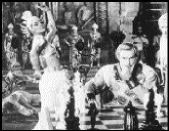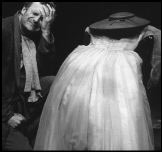FANTASTIKA: THE FILMS OF RUSSIAN FANTASY MASTER, ALEKSANDR PTUSHKO
Runs Jan. 18- 31 at Grand Illusion
PEOPLE ASSUME that films produced within the Soviet system were only about tractors and happy workers and had little artistry. Perhaps this is why the moody fantasies of Aleksandr Ptushko (1900- 1973), with their peasant heroes creeping past painted backdrops and glittering boulders to escape beautiful witches, have been screened so rarely in the West and are largely unavailable on video.
Fortunately, four of these neglected films arrive directly from New York’s Lincoln Center. Running Jan. 22- 24, The New Gulliver (an apparent reference to the Bolshevik ideal of the “New Man”) was the world’s first feature-length animation, made in 1933—before Disney’s Snow White—with over 3,000 puppets. In this revolutionary retelling, a Soviet schoolboy falls asleep reading Gulliver’s Travels, wakes up in a Lilliput of capitalist exploitation, and inspires the people to proletarian rebellion.
The spare resources of Cold War cinema show strongly in 1946’s The Stone Flower (Jan. 18- 20), Russia’s first color feature (made possible by the booty of Agfa film stock after the German surrender). Danila, a blond, tall, gifted malachite carver searching for artistic perfection, is lured away from his wedding banquet by the jealous Queen of Copper Mountain. The primitive double-exposure effects and stagy melodrama, reminiscent of Frankenstein, seem a decade or two behind The Wizard of Oz. With interludes of folk singing, Cossack dancing, and Danila’s bread-and-salt wedding, Stone Flower celebrates the virtues of Ural peasantry and promotes Stalinist nation building.
Fans of horror and fantasy will delight in the stunning grotesqueness and flying caskets of 1967’s Viy (Jan. 25- 27), adapted from a story by Nikolai Gogol. 1953’s Homeric Sadko (Jan. 29- 31), with its hero’s journey searching for the bluebird of happiness, is one of the few Ptushko films to have been released in the West (as The Magic Voyage of Sinbad in 1962), but only after being recut and dubbed to hide its Russian origins.
These imaginative and delightful films can be enjoyed as they are, but fairy tales should never be mistaken for safe, apolitical children’s fancy. Later Soviet directors would use fairy tales to obliquely criticize the state, but for a child of the revolution like Ptushko—as for the Brothers Grimm—they’re populist assertions of national identity. The utopian ideals that animate these films now seem as remote as the land of faerie.








